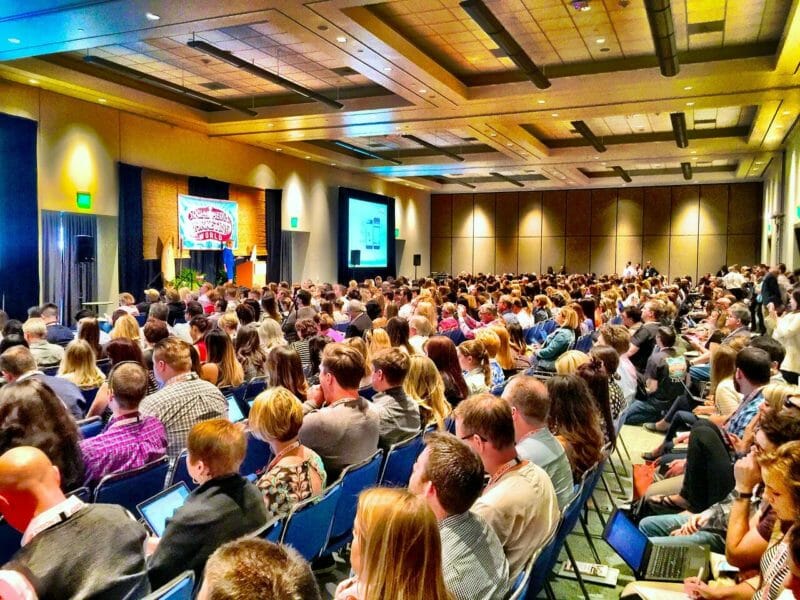
See how to plan an event from defining its objectives to choosing the speakers.
Corporate events are ideal for all types of brands, from those that are already well positioned in the market to those that are not yet so well known and want to attract a larger audience.
This happens because many companies take advantage of these opportunities to publicize their business in the market, attract investors and become a reference in their area.
But do not think that the good relationship of the company should be built only with its audience, investors and partners.
It is also necessary to be a reference for the people who work with you and even for your competitors.
That is why there is nothing better than a corporate event. With it, you create opportunities to show that you are an authority in your market, as well as to improve communication with all the participants of the event.
If you never thought about organizing corporate events to charm your market, follow this post until the end and you will see how you learn to do it.
We will give you some tips to help you from the definition of the objective of your event to the selection of the speakers and, at the end, you will understand how this strategy is important to position yourself in your market.
What are corporate events?
As the name itself explains very well, corporate events are social events aimed at a specific audience and with well-defined objectives, for example:
- Presenting an idea,
- Attract investors,
- Educate an audience,
- To position itself as a reference in the market.
- To launch a new product.
In other words, events are a market strategy to achieve a certain goal.
However, those who believe that the objective of a corporate event is only to sell are mistaken. Of course, you can use the event as a real sales channel, but this is only one of its functions.
Some are held for a commemoration, for example, and can be restricted to company employees, or be open to the external public, such as investors and other entrepreneurs in your market.
However, even though this basic concept is understood, there are some differences in the types of events that can be done. This ends up making it difficult for the entrepreneur to choose the best format for their business.
What are the types of corporate events?
The list of types of corporate events is extensive, and that is why we decided to talk only about the main and best known ones.
This way, it will be easier to know which is the ideal type of event to meet your brand’s objectives.
Congress
Congresses are events based on the discussion of topics previously defined by groups that share related interests and knowledge.
Generally, they are restricted and classified according to the area of knowledge that will be the object of discussion.
It is one of the most complex types of corporate events, and can include other modalities and types of events, such as conferences and round tables.
You are more likely to see this type of event carried out by associations, universities, groups and professional categories.
Conference
The conference is very similar to the congress, but one of its biggest differences is the formality.
Generally, each conference has the participation of a great authority in a certain area, chosen to make an in-depth presentation of a previously defined issue.
The organization of events, in the case of the conference, must be quite careful since, in this format, only the invited authority can elaborate on the matter for a longer period of time.
However, there is nothing to prevent the opening of a space for discussion and the elaboration of questions, almost always made in writing.
Round Table
A round table works more or less like a debate and it is necessary that a thesis or problem has been previously presented.
During the round table several people meet and start a deep discussion about the theses defended by each of the participants who are there.
This is a work of knowledge construction through criticism.
This discussion can take place long before the elaboration of the round table. But it is only at that moment that the criticisms are exposed and shared with the participants of the round table.
Panel
The panel is one of the most challenging corporate event formats.
Some people meet with the purpose of sharing with a large group some theses defended and presented by a smaller group.
Just imagine, for example, a press conference, where questions are asked about often controversial issues.
Presentations
This is undoubtedly one of the most popular types of corporate events.
During a conference, one or more people defend arguments and share the knowledge that they can be questioned at the end of the presentation, at the right time for debate.
Unlike what happens at the conference, here participants can be more active, given the informality of the event.
It is possible, for example, to ask questions directly to the speaker.
Convention
The convention is a great gathering of people who share similar tastes.
An example are conventions that bring together students, engineers, geeks and nerds or film buffs.
In the business field, conventions are mainly used to promote sales and announce new products in the market.

Brainstorming
This type of social event is great for stimulating the development of ideas.
Several people meet to think of solutions and alternatives to obvious and previously identified problems.
There is no value judgment formation during the event, which allows participants to argue and share their ideas without fear.
Seminar
The seminar is basically a set of lectures. It can last a day or even several weeks.
In this form of event several activities take place, all of them of informative or educational character, with the objective of training or helping in the cultural and scientific maturation of the participants.
What is the importance of events for companies?
As we said before, corporate events are fundamental to help in the growth of the company and, mainly, to position itself in the market.
Besides, they also contribute to improve the existing relationship between the brand, customers, suppliers, investors and even its collaborators, since it is a time when everyone is in contact in person.
That is why corporate events are used for networking, that is, meeting new people and creating a network of company accounts, which helps in the disclosure of products and services.
How to organize a corporate event?
The organization of corporate events demands a complete planning that goes from establishing a goal to the final arrangements, such as those related to the structure, personnel involved and disclosure.
Set a goal
It is not possible to start organizing a corporate event without having a goal in mind. After all, holding an event is also a market strategy and therefore needs to have a purpose.
The objective may vary:
- To bring the brand closer to the customers,
- Disseminate a new product,
- Get market partners,
- Place the mark in a prominent position,
- Educate your audience.
Define your budget
The second step is to define the budget, that is, how much the company is willing to pay for the event.
This is fundamental because the cost varies according to the type of event, duration, location, number of guests and the speakers hired, among other details you need to define, such as food and cultural attractions.
Choose date, place and time
The date, place and time of the event must be thought in advance and mainly to provide the best result for you, as well as for who will participate in your event.
If the event is in an open environment, for example, the date should be aligned with the weather forecast. In the end, everyone wants to avoid rainy days.
At the same time, it is important to think about the audience, so that they can prepare themselves if they have to travel or change the schedule of a working day to participate in your event.
Find the perfect speakers
What will define the number of speakers at your corporate events is the budget available, as quality cannot be questioned here.
Of course, it is important to involve people who are known in your market to discuss the topics you have defined! After all, this comes to the attention of the public mainly when we plan corporate events for our audience.
But don’t worry about calling in the celebrities.
Your speakers can even be people who have worked in your company before, have advanced knowledge in the area they are acting in and want to share their knowledge.
Create outreach materials
You know that old saying that propaganda is the soul of the business?
It also applies to corporate events, mainly when they are aimed at external audiences.
You need to implement various outreach strategies, such as social media publications, emailing and others that you know will reach your audience.
Try everything first
Don’t think that the organization of your event is over as soon as you have sold all the tickets.
To do it well, everything must be tested before the big day. This applies to the presentations, microphones, lighting, sound and all other aspects of the infrastructure.
It is not good to realize that things do not work on the day of the event.
Keep in touch with your customers
One of the main objectives of a corporate event is to create and increase communication with customers. That is why it is important to obtain the contacts of all the participants and to maintain a post event interaction. This is called relationship marketing.
Also, don’t forget to collect feedback from those who participated. This way you can understand what has worked and what can still be improved.
All those who participate in a corporate event are, in a way, showing some interest in your brand.
That is why it is an audience that deserves attention, since those people are likely to buy your products and services.
But corporate events are only one way to attract customers.
If you can’t invest in that kind of strategy yet, don’t be discouraged. Read our post that shows you how to charm customers with free materials.
